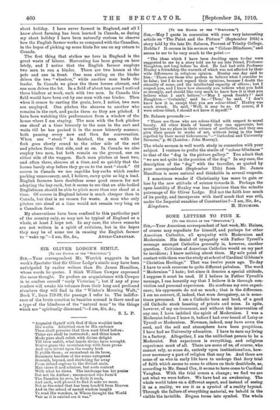[To THE EDITOR Or THE " SPECTATOR."]
Sin,—May I quote in connexion with your very interesting article on "The Paint and the Picture" (September 10th) a story told by the late Dr. Salmon, Provost of Trinity College, Dublin ? It occurs in his sermon on " Colour-Blindness," and seems to me to be very much to the point
The ideas which I have been dwelling upon to-day were suggested to me by a story told me by my late friend, Professor Houghton, not long before he died. He had had with Professor Huxley a friendship the warmth of which was not affected by their wide differences in religious opinion. Huxley one day said to him : There are those who profess to believe what I consider to be false; but I do not regard their opinions, because I doubt the sincerity of some, and the intellectual capacity of others ; but I respect you, and I know how sincerely you believe what you hold so strongly, and should like very much to know how it is that you believe what I can't believe.'—` May I speak frankly ? ' said Houghton. Certainly,' said he. = Then,' he said, ' I don't know how it is, except that you are colour-blind.' Huitley was much struck. He said, Well, it may be so. Of course, if I were colour-blind, I should not know it myself."
Dr. Salmon proceeds :-
"There are those who are colour-blind with respect to moral beauty. All other kinds of beauty they can appreciate, but morality has no place in their science of aesthetics, and they can give their praise to works of art, without being in the least repelled by their moral hideousness."—" Cathedral and University Sermons," p. 86 (London : John Murray).
The whole sermon is well worth study in connexion with your subject. I venture to prefer the simile of " colour-blindness " to that of the " dog in the picture gallery." You admit that " we are not quite in the position of the dog." In any case, the description of the "dog" with the traveller, as quoted by your correspondent (September 17th) from Dr. James Hamilton is more natural and thinkable in several respects.
I sometimes wonder if Christianity has more to gain or lose by the new attitude of science towards it. Perhaps the open hostility of Huxley was less injurious than the eclectic patronage of Sir Oliver Lodge. Did not the faith lose much of its purity, and incorporate with itself much that was evil, under the Imperial sunshine of Constantine P—I am, Sir, &c.,










































 Previous page
Previous page